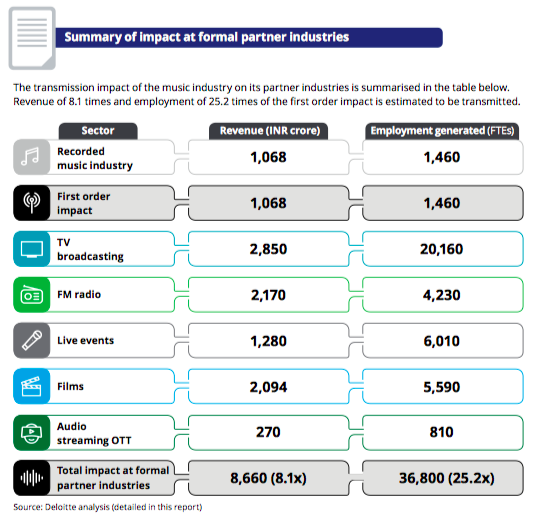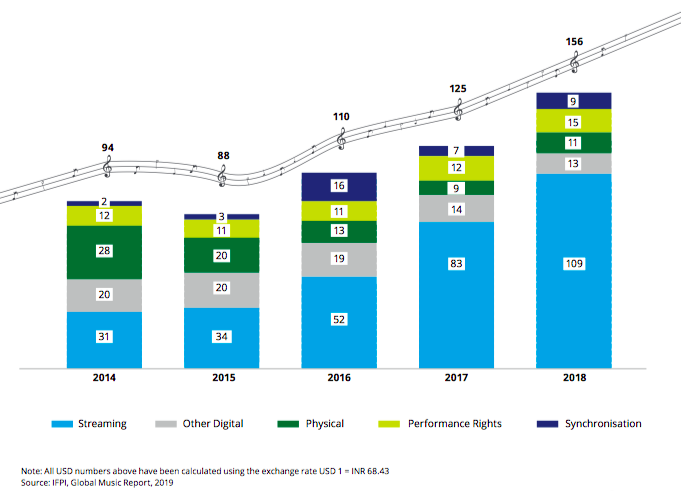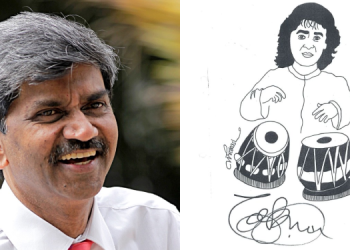New Delhi: Indian Music Industry (“IMI”), the apex trade body representing the recorded music companies on a pan-India basis, along with Deloitte today jointly launched “Economic impact of the recorded music industry in India” report at Dialogue: The Indian Music Convention 2019. Ms Sumita Dawra, Joint Secretary, DPIIT, unveiled the report along with Mr Vikram Mehra, Chairman, IMI and Managing Director, Saregama India and Mr Blaise Fernandes, President and CEO, IMI.
Also present at the launch were – Lauri Rechardt, Chief Legal Officer, International Federation for Phonographic Industry (“IFPI”); KT Ang, SVP, Public Policy – Asia, Universal Music Group and Edwin Yee, SVP and Regional Counsel, Sony Music Group and Jehil Thakkar, Partner, Deloitte India.

The report estimates recorded music industry in India to be INR 1,068 crore (about 0.006% of India’s GDP), employing 1,460 full-time employees. It pegs the ripple economy effect to be more than 8.1 times the size of the recorded music its size, with estimated revenue of INR 8,660 cr, generating full-time-equivalent (FTE) employment of 38,600 (25.2 times the employment generated by the recorded music industry). These estimates do not include the multitude of informal users/usage of music which touch large sections of society – such as brass bands, small restaurants, parlours, and gymnasiums. Lastly, the report highlights the non-quantifiable but powerful effects of music, including its ability to cut across cultures and its ability to heal.

“Every 10% growth in the music industry is expected to generate INR 810 cr of additional revenue in the economy from formal partner industries and can ensure employment in the region of 3,600-3,700 FTE in formal partner industries. While at present, the recorded music industry is growing in pace with changing technological trends and is earning significant revenue from streaming services, among other channels in the ecosystem. It is important to establish a fair value to all stakeholders in the value chain. We can expect additional investments in this sector if the fair value and value gap issue get fixed” said, Vikram Mehra, Chairman, IMI. The IMI-Deloitte report states the need to unlock fair value for the music industry by systemic policy changes and cohesive approach towards eradicating piracy. Lack of fair value is seen as the the biggest hurdle, creating bottlenecks for investments, addressing which will pave the way for India to become one of the top 10 music markets in the world.
Vikram Mehra, Chairman, IMI said, “The recorded music industry is uniquely placed in India to enter the top 10 music markets.However, we still have a lot of work to do, and we need govt.’s help in the same. If Fair Value is accorded to the Copyright Owners of recorded music it will unleash tangible and intangible benefits, both economic and social. Just imagine the lives the music industry can and will touch, the employment that it can and will generate and the contribution to the economy and GDP that it does but is so sparingly measured.”
Expressing his views on the issue Blaise Fernandes, President, and CEO, IMI said, “India will always be a culturally rich nation with a long history of diverse and engaging music, it is languishing at number 15 in the world in terms of the recorded music industry size per IFPI metrics. It is hardly at par with the country’s global and economic or cultural position. Clearly representing a value gap in the entire music value chain – if the value gap problem is addressed this will usher in a new era for the music industry in India. The creative talent and the recorded music industry are partners with the high-value platforms, but this report indicates that the partnership needs recalibration in favour of the recorded music industry and the creative community.”
Jehil Thakkar, Partner, Deloitte India, said, “Music is a universal language, and is a powerful tool to expand India’s influence and spread awareness of many things Indian − be it yoga, tourism, or made-in-India products. India’s diversity in culture and language has made the country’s musical output rich and varied. It is important for all stakeholders to cherish, preserve, and invest in India’s creative communities as the country looks to take its rightful place in the world.”

















